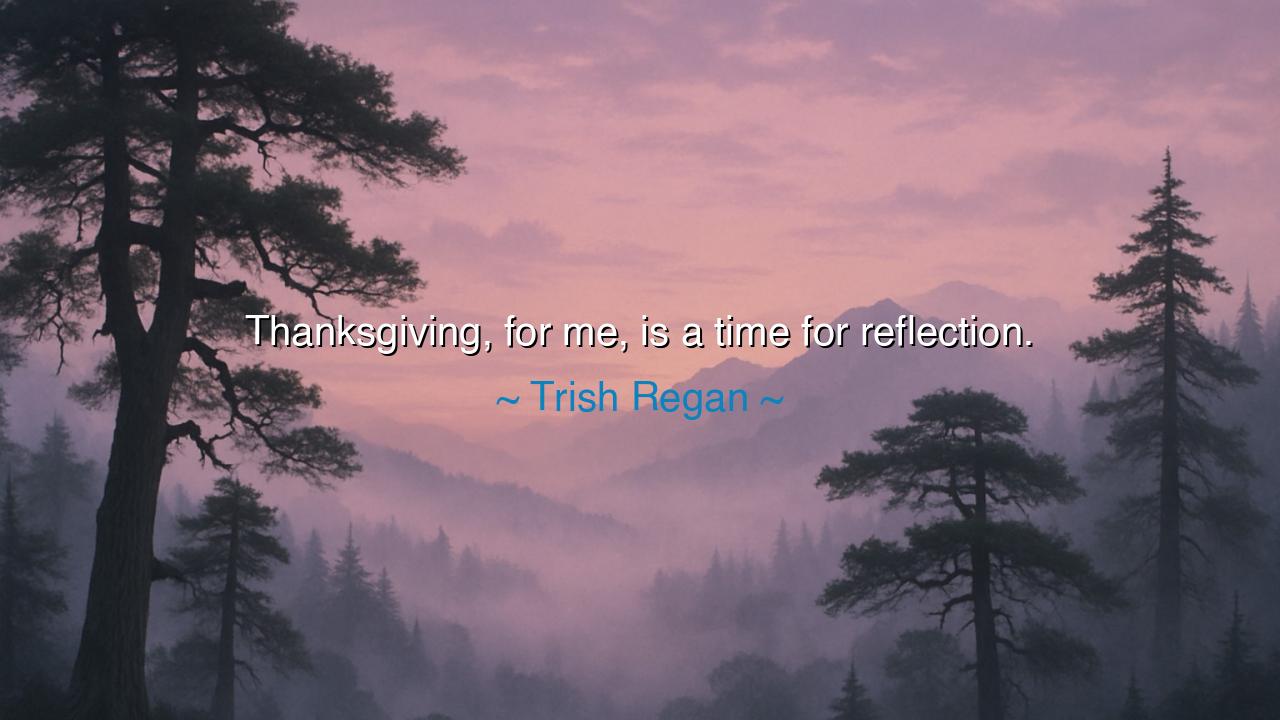
Thanksgiving, for me, is a time for reflection.






"Thanksgiving, for me, is a time for reflection." In these simple words, Trish Regan captures not only a personal sentiment but also a profound truth about the nature of sacred days. The holiday is not merely about feasting or gathering, but about turning the gaze inward and allowing the soul to pause amidst the rush of life. To reflect is to look upon one’s journey with honesty, to acknowledge both triumphs and sorrows, and to measure the worth of one’s path against the light of gratitude. In this way, Thanksgiving becomes more than an outward celebration; it becomes a mirror for the spirit.
The origin of Thanksgiving rests in a union of survival and thankfulness, when settlers and native peoples shared a harvest meal after enduring the hardship of an unforgiving land. It was not born of excess, but of survival and humble thanks. In its beginning was already planted the seed of reflection—a turning of the mind to recognize that every blessing is hard-earned and every feast is made possible by labor, patience, and the hand of providence. Regan’s words remind us to return to this ancient root: gratitude not as habit, but as conscious remembrance.
Consider the tale of Abraham Lincoln, who in the midst of civil war declared Thanksgiving a national holiday in 1863. The nation was torn apart, yet Lincoln urged the people to reflect not on destruction, but on the bounties that still endured: the fields that yielded, the factories that produced, the families that held together in spite of fear. This is the power of reflection—it allows us to see light in the midst of darkness. His proclamation was less about harvest and more about healing, teaching that even when surrounded by grief, the heart can find reason to be thankful.
When Regan says “a time for reflection,” she points us away from the distractions of outward abundance and toward the quieter abundance within. Food, family, and festivity are gifts, but without reflection they pass like smoke. With reflection, however, even the smallest moment—a child’s laughter, a candle’s flame, a memory of an ancestor—becomes eternal. Reflection transforms the fleeting into the lasting, the ordinary into the sacred.
In truth, the ancients always honored the act of reflection. The Greeks spoke of “know thyself,” and the Stoics urged men to examine their days before sleep, asking, “What have I done well? What have I done poorly? What remains to be done?” Thanksgiving can be seen as a grand echo of this practice, a collective self-examination where a nation, a family, or an individual looks inward to weigh the year not in wealth but in wisdom.
Reflection is not always comfortable. To reflect is to see the wounds as well as the joys, to remember where one has failed and where one has been lifted up by the hand of another. Yet it is precisely in this honesty that growth is born. Just as a farmer studies his field to learn where soil is rich and where it is barren, so too must we look within to discern what parts of our lives nourish the spirit and which lie fallow.
The lesson, then, is clear: let every Thanksgiving, and indeed every season of pause, be marked not only by gratitude, but by true reflection. Ask yourself: What have I learned? Whom have I helped? Where have I faltered? Where have I been blessed beyond measure? Such questions sharpen the soul and make the feast not only a meal for the body, but a banquet for the spirit.
Practical action follows naturally: set aside time amidst the gatherings and the noise to write, to pray, or to sit in stillness. Share aloud the blessings you recall and the lessons you carry. Encourage children to speak not only of what they want, but of what they have received. In this way, Thanksgiving fulfills its highest purpose—not just as a day of plenty, but as a yearly temple for the soul’s reflection.






AAdministratorAdministrator
Welcome, honored guests. Please leave a comment, we will respond soon